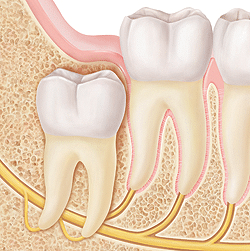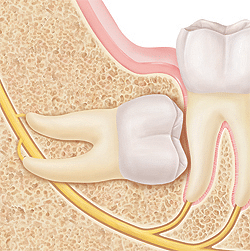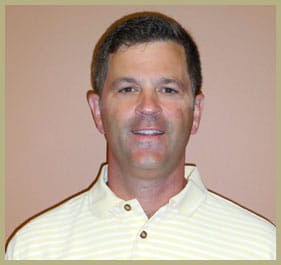Problems Caused by Impacted Teeth
Impacted wisdom teeth can cause acute (sudden) problems, chronic (ongoing) problems, or no problems at all. Removing the teeth before symptoms develop can prevent or reduce future complications. Dental x-rays can help your dentist find existing problems. X-rays may also help show whether your wisdom teeth are likely to cause problems in the future. But it's not always clear whether your wisdom teeth will give you trouble. Potential problems include:
- Acute pericoronitis (gum infection). As the tooth breaks through the gum, the gum can become infected, causing pain, swelling, and sometimes bleeding.
- Chronic periodontal (gum) disease. Problems flossing at the back of the mouth can lead to gum disease. Or it may result if bacteria and food debris collect under the gum tissue covering an impacted tooth. Gum disease can lead to loss of the adjacent molar.
- Tooth decay. Wisdom teeth can be hard to clean because they're at the back of the mouth. This can lead to decay of both the wisdom tooth and the tooth next to it.
- Crowding. An impacted tooth can push on nearby teeth, forcing them out of alignment. This can interfere with your bite. Crowding can also damage individual teeth.
- Poorposition. A tooth that grows pointing in toward the tongue or out toward the cheek can irritate nearby tissue. It may interfere with your bite. Problems can also occur if there is no corresponding tooth in the opposite jaw for the tooth to bite on.
- Cysts and tumors. A tooth that's embedded in the bone is encased in a sac. This sac can fill with fluid, forming a cyst. A cyst can expand and destroy surrounding bone. In rare cases, a tumor forms in this area.
Glick & Woods Dentistry is Tullahoma’s most popular dental experience since 1985. Please call us at 931.455.3917 or fill out our online Request an Appointment form to arrange your consultation.














